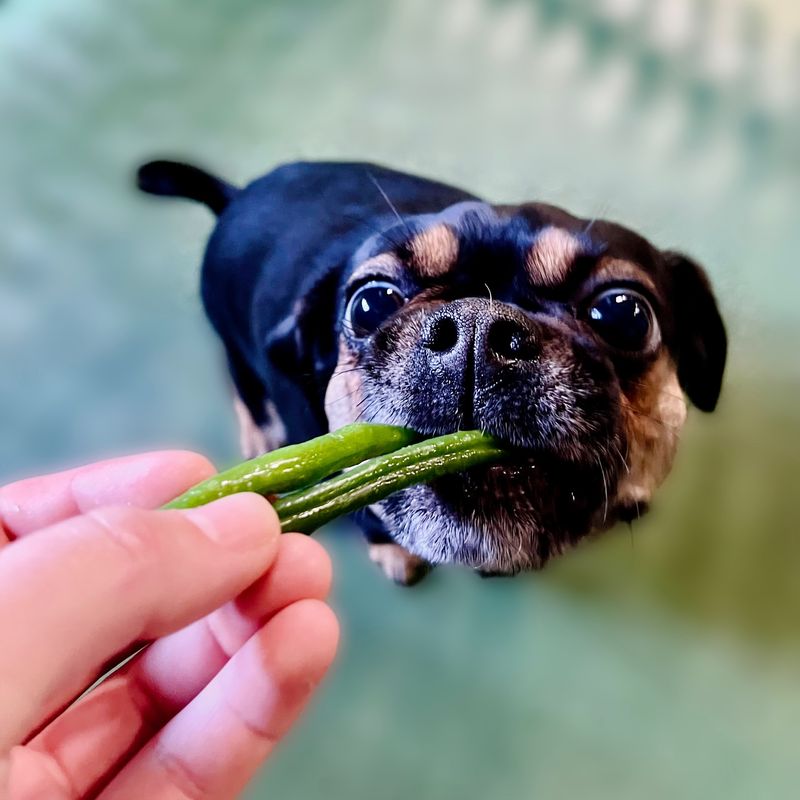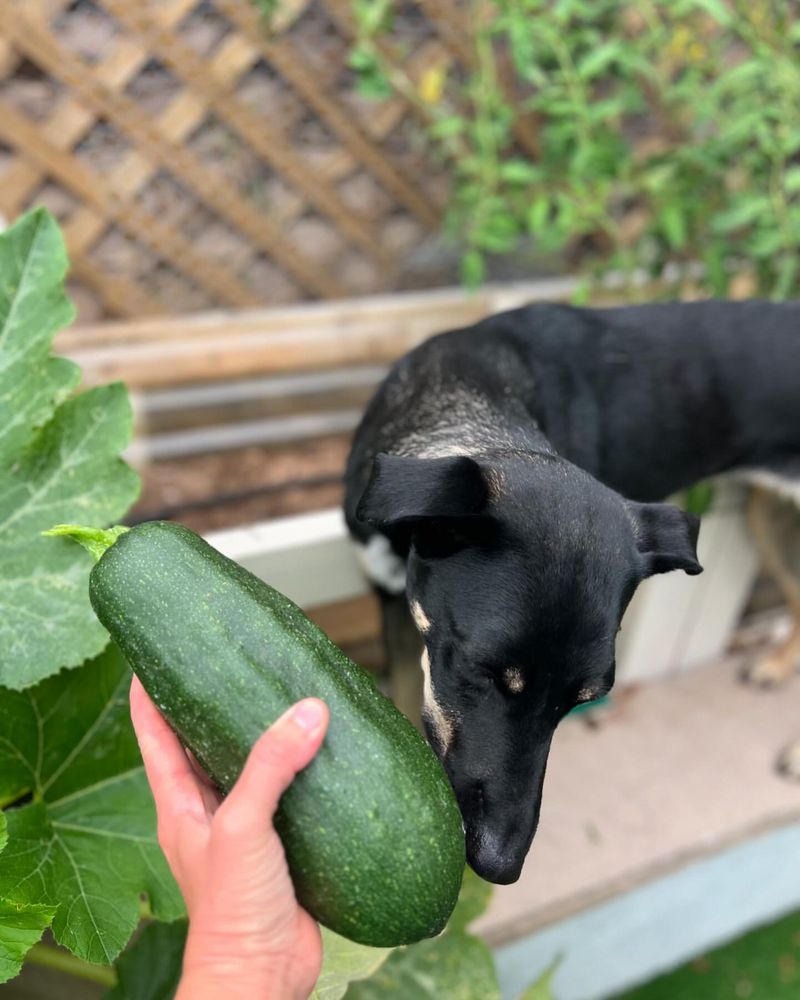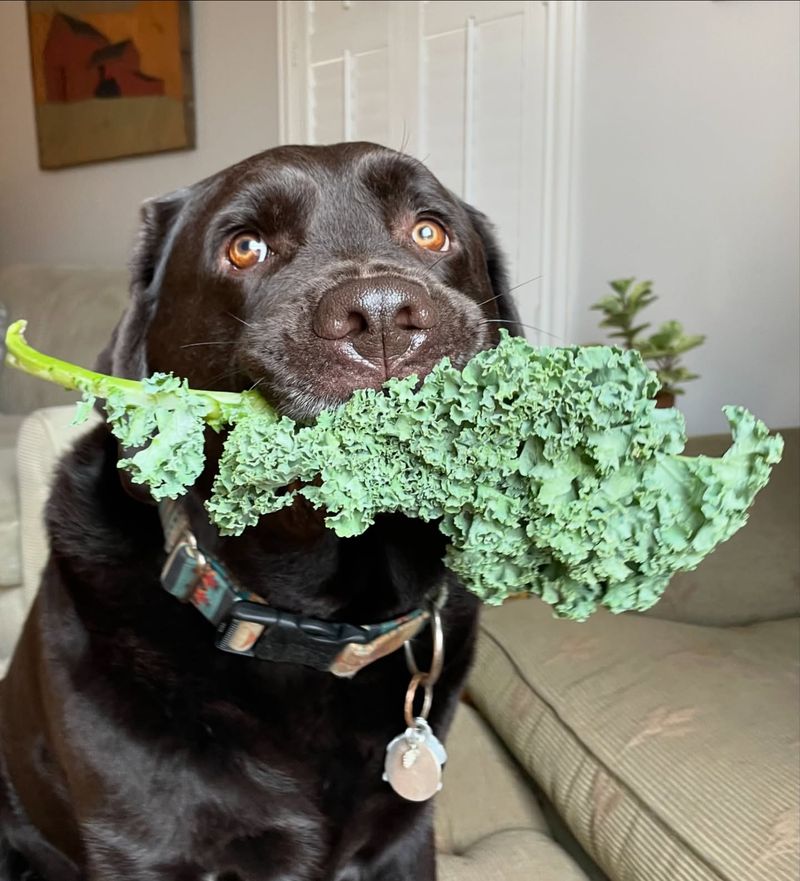Discover a range of vegetables that are not only safe for your canine companions but also contribute to their health and well-being. These 19 dog-friendly vegetables provide essential nutrients and offer a variety of flavors and textures to keep your pet’s diet both nutritious and enjoyable.
Carrots
Carrots are a fantastic vegetable for dogs. They provide a satisfying crunch that dogs enjoy while being low in calories. Packed with beta carotene and fiber, they promote eye health and aid digestion.
Carrots can be served raw or cooked, making them a versatile addition to your pet’s diet. When feeding raw, remember to cut them into bite-sized pieces to avoid choking hazards.
These vibrant orange veggies not only support your dog’s vision but also work as a natural toothbrush, helping to keep your pup’s teeth clean.
Sweet Potatoes
Sweet potatoes are a wholesome treat for dogs, rich in dietary fiber, vitamins A and C, and antioxidants. These nutrients support your dog’s immune system and promote healthy skin and coat.
When serving sweet potatoes, it’s best to cook them, either by steaming or boiling, to make them easier to digest.
Avoid adding any spices or sugar. These orange tubers are not only tasty but also beneficial for your dog’s digestive health, making them a great addition to their diet.
Pumpkin
Pumpkin is a superfood for dogs, known for its high fiber content and abundance of vitamins. It helps regulate the digestive system, making it a go-to remedy for both diarrhea and constipation.
Fresh or canned pumpkin (without added sugars or spices) can be easily incorporated into meals.
Dogs love its mild sweet taste, and it pairs well with other foods. Offering pumpkin regularly can ensure your furry friend’s tummy stays happy and healthy.
Peas
Peas are small but mighty when it comes to dog nutrition. They are packed with protein, fiber, and several vital vitamins like A, B, and K.
Dogs typically enjoy the sweet taste and crunchy texture of fresh or frozen peas. You can add them to regular meals or serve them as a standalone snack.
Peas provide a healthy boost to your dog’s diet and can be particularly beneficial for energetic dogs needing a little extra protein.
Green Beans
Green beans are a nutrient-rich vegetable that dogs can safely enjoy. They are low in calories but high in fiber and essential vitamins like C and K.
These beans can be a crunchy snack when raw or a softer treat when boiled. Make sure to serve plain, without any added salt or seasonings.
Including green beans in your dog’s diet can aid in weight management, making them an excellent choice for overweight pets seeking a healthy snack.
Spinach
Spinach is a leafy green vegetable that offers a wealth of nutrients for dogs. It’s loaded with iron, antioxidants, and vitamins A, C, and E, all of which support a healthy immune system.
While spinach can be a healthy supplement, it should be fed in moderation due to its oxalate content, which can interfere with calcium absorption.
Lightly steaming the leaves before serving can make them easier to digest and enhance nutrient absorption for your furry friend.
Broccoli
Broccoli is a great vegetable choice for dogs, offering plenty of fiber, vitamins C and K, and antioxidants. These nutrients contribute to a strong immune system and support overall health.
It’s best to serve broccoli in small amounts to avoid stomach upset. Dogs can enjoy it cooked or raw, but be sure to keep the portions manageable.
Adding broccoli to your dog’s diet can provide a refreshing crunch and a nutritious boost to their daily meals.
Zucchini
Zucchini is a low-calorie vegetable that dogs can enjoy without the worry of weight gain. It’s rich in vitamins C and B6, potassium, and manganese, contributing to metabolic health and proper muscle function.
You can serve zucchini raw or cooked, and it pairs well with other vegetables in your dog’s diet.
Its mild flavor and soft texture make it an easy addition to any meal, and it’s particularly refreshing during the warmer months.
Cucumbers
Cucumbers are a hydrating and low-calorie snack for dogs. Composed primarily of water, they help keep your pet hydrated while providing a crisp, refreshing taste.
They are also a good source of vitamins K and C, along with potassium and magnesium. Slice them thin for a crunchy treat or mix them into your dog’s meal.
Cucumbers offer a cool, crunchy bite that can be particularly appealing during the summer, making them a delightful addition to your pet’s menu.
Celery
Celery is an excellent vegetable for dogs, offering a satisfying crunch and plenty of nutrients. It contains vitamins A, C, and K, as well as folate and potassium, supporting heart health and reducing inflammation.
Dogs often enjoy munching on celery stalks, and its crunchy texture can help freshen breath.
When serving, cut the stalks into manageable pieces to prevent choking. Celery can be a great low-calorie snack or a fun addition to your dog’s regular meals.
Bell Peppers
Bell peppers are a colorful treat for dogs, packed with antioxidants like beta carotene, and vitamins A and C. These nutrients help boost the immune system and promote healthy skin and coat.
All colors of bell peppers are safe for dogs, though red ones tend to be the sweetest. It’s best to remove the seeds and stem before serving.
Bell peppers are a crunchy, tasty addition to any meal, offering both flavor and nutrition to your pet’s diet.
Cauliflower
Cauliflower is a versatile vegetable that dogs can enjoy either raw or cooked. It’s low in calories but high in fiber, vitamins C and K, and folate, supporting overall health.
Whether served as a snack or mixed into meals, cauliflower provides a satisfying crunch and a subtle flavor that dogs often appreciate.
When introducing cauliflower to your dog’s diet, start with small portions to prevent any digestive issues. Its nutritional profile makes it a worthy addition to their menu.
Asparagus
Asparagus is a nutrient-rich vegetable that can be a unique treat for dogs. It contains vitamins A, C, and K, along with folate and fiber, supporting digestive health and boosting the immune system.
This vegetable is best served cooked, as raw asparagus can be tough to digest. Make sure to cut it into bite-sized pieces to prevent choking.
While not all dogs may find asparagus appealing, it offers a range of health benefits that can complement your pet’s diet.
Brussels Sprouts
Brussels sprouts are a nutritious vegetable that dogs can safely enjoy in moderation. They are packed with vitamins C and K, fiber, and antioxidants, supporting a healthy immune system.
When feeding Brussels sprouts, it’s best to cook them lightly to aid digestion. Serve in small portions to avoid any gastrointestinal issues.
Their slightly bitter taste might take some getting used to, but the health benefits make them a valuable addition to your dog’s diet.
Lettuce
Lettuce is a hydrating and low-calorie vegetable that can be a refreshing snack for dogs. Composed mostly of water, it’s an excellent option for keeping pets hydrated.
Different types of lettuce offer slightly different textures and flavors, with Romaine being more nutrient-dense than iceberg.
Dogs typically enjoy the crunchiness of fresh lettuce leaves, making it a delightful addition to their meals. Just be sure to wash thoroughly before serving to remove any pesticides.
Parsnips
Parsnips are a root vegetable that can add variety to a dog’s diet. They are rich in vitamins C and B6, folate, and potassium, supporting overall health and well-being.
Parsnips have a slightly sweet flavor that many dogs find appealing. You can serve them cooked for easier digestion.
This versatile vegetable can be sliced into small pieces and mixed into your dog’s meals or served as a standalone treat, adding both flavor and nutrients to their diet.
Kale
Kale is a leafy green vegetable packed with nutrients that can benefit dogs when fed in moderation. It offers vitamins A, C, and K, calcium, and iron, supporting bone health and immune function.
Due to its high fiber content, it’s important to introduce kale slowly to prevent digestive issues. Lightly steaming the leaves can help improve digestibility and nutrient absorption.
Kale can be a nutritious addition to your dog’s diet, adding variety and valuable nutrients.
Cabbage
Cabbage is a versatile and healthy vegetable that dogs can enjoy cooked or raw. It contains vitamin C and K, fiber, and powerful antioxidants, contributing to a healthy digestive system.
When feeding cabbage, it’s best to cook it lightly to aid digestion and avoid potential gas. Dogs may enjoy the crunch of raw cabbage, but moderation is key to prevent stomach upset.
This leafy vegetable can add flavor and nutrients to your dog’s meals, supporting their overall health.
Squash
Squash is a nutritious vegetable that comes in various forms such as butternut, acorn, and spaghetti squash. It’s rich in fiber, vitamins A, C, and E, supporting healthy digestion and a robust immune system.
It’s best to serve squash cooked, as the raw texture can be difficult for dogs to digest. Remove the seeds and skin before serving.
Incorporating squash into your dog’s meals can provide a sweet taste and essential nutrients, making it a delightful and healthy treat.



















